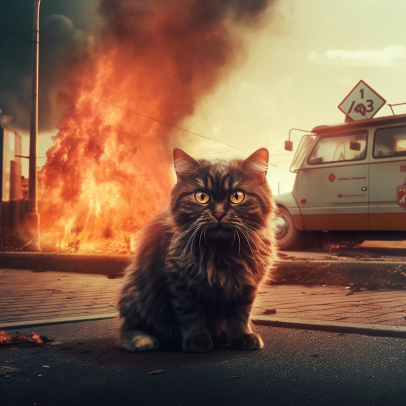Do Cats Fart? The Mysterious Whiffles of a Maine Coon Cat

“Today, I'm here to unravel a fascinating mystery that has intrigued both humans and felines alike: Do cats fart?” - Miles the Maine Coon
Introduction
Understanding the Digestive System of Cats
Hey there, fellow cat lovers! Let's talk about something that's both intriguing and a bit silly—cat flatulence! You see, us cats have a pretty important digestive system that affects our overall health, including whether or not we let out a toot. Our digestive journey includes the mouth, esophagus, stomach, small intestine, and large intestine. Understanding how it all works can give you some insight into why we might have some gas from time to time.
Factors Influencing Cat Flatulence
So, what causes us cats to pass gas? Well, there are a few factors at play. One biggie is our diet and nutrition. Some foods can be a little harder for us to digest, leading to more gas in our tummies. We can also have food allergies or sensitivities that mess with our digestion and make us a bit gassier. Other things that contribute are swallowing air while chowing down and having certain medical conditions that affect how we process food.
Common Misconceptions about Cats and Farting
Now, let's clear up a couple of misunderstandings about cats and farting. First off, some people think we never fart at all. That's not true, my friends! While we might not produce as much gas as some other animals, we do let out the occasional toot. Oh, and here's another myth—we're often told our farts are odorless. Well, let me tell you, that's not always the case! Our gas might not be as smelly as a dog's or a human's, but it can definitely have a noticeable odor. Just thought I'd set the record straight on that one!
Signs and Symptoms of Cat Flatulence
Detecting Farting in Cats
Now, let's talk about how you can tell if your feline friend is farting. It can be a bit tricky to spot since we're not as obvious or frequent about it as some animals. But don't worry, there are a few signs you can look out for. Keep an eye on changes in our behavior—things like excessive grooming, restlessness, or signs of discomfort. You might also notice some interesting smells or sounds coming from our rear ends, which can be a pretty good indicator of gas passing through.
Unusual Odors and Sounds
When it comes to the smells and sounds of our flatulence, let me tell you, it can be quite unique! If you catch a whiff of a foul odor or hear soft pops or hissing sounds coming from our behinds, chances are we're releasing some gas. These odors and sounds are different from the normal bodily functions like digestion or passing stool, so they're a pretty good clue that we're feeling a little gassy.
Changes in Cat's Behavior
Flatulence can affect our behavior too, you know. When we're dealing with excess gas, we might seem uncomfortable or restless. We might have a bloated belly, try to relieve ourselves by rubbing our rears on the floor, or show signs of discomfort while sitting or lying down. So, if you notice these changes in us, it's a sign that we might be experiencing some flatulence issues.
Causes of Flatulence in Cats
Diet and Nutrition
Now, let's talk about what we eat because it plays a big role in our flatulence situation. Some foods, especially those high in carbs or fiber, can be a bit harder for our delicate tummies to handle. They can make us gassier than usual. Cheap cat foods or sudden changes in our diet can also mess with our digestion and make us a bit more tooty.
Food Allergies and Sensitivities
Just like you humans, we cats can have food allergies or sensitivities. If we're allergic to certain ingredients in our food, it can really mess up our digestion and make us more prone to flatulence. It's important for our humans to identify and eliminate any potential allergens from our diet to help reduce gas caused by these food issues.
Ingestion of Air
Sometimes, we accidentally swallow air while gobbling down our meals. Especially if we're eating too fast or just really enthusiastic about our food! This air can get trapped in our digestive system, leading to more gas and, you guessed it, more farting. So, it's a good idea to slow us down during mealtime and maybe even use some special feeding techniques to help minimize the amount of air we gulp down.
Underlying Medical Conditions
If our flatulence is persistent or just won't go away, it might be a sign of an underlying medical condition. Things like inflammatory bowel disease (IBD), gastrointestinal infections, or intestinal parasites can mess up our digestion and cause excess gas. So, if our farting doesn't improve or if there are other concerning symptoms, it's best to take us to the vet to rule out any health issues.
Managing Cat Flatulence
Dietary Modifications for Reducing Flatulence
Alright, let's get to the good stuff—how to manage our flatulence! One of the best ways is to make some changes to our diet. Switching to high-quality cat food with easily digestible ingredients is a great start. It's also a good idea to avoid foods that are known to cause gas. A balanced and appropriate diet will help keep our tummies happy and reduce the likelihood of us letting out a big toot. Oh, and remember to make any diet changes gradually, so we don't get upset tummies!
Introducing Probiotics to Improve Digestion
Here's a cool trick that can help with our digestion—probiotics! These are little beneficial bacteria that can support our gut health. Our humans can introduce probiotic supplements or foods that naturally contain probiotics to our diet. These little guys can help restore the balance of good bacteria in our tummies and improve digestion. By doing so, they reduce gas production and the chances of us sending some stinky smells your way.
Slow Feeding Techniques to Minimize Air Intake
Hey, remember when I mentioned swallowing air? Well, we can minimize that by using some cool slow feeding techniques. Our humans can get us specialized bowls or puzzle feeders that make us eat at a slower pace. This way, we're less likely to gulp down air along with our food. Slowing down our eating habits helps us digest our meals better, reduces gas, and, ultimately, makes for fewer farts. It's a win-win for everyone involved!
Seeking Veterinary Advice for Chronic Flatulence
If our farting problem just won't quit or if it's causing us discomfort, it's time to seek some professional help. That means taking us to the vet, my friends. The vet will give us a thorough examination, go through our medical history, and may even run some tests to figure out what's going on. Once they've identified the underlying cause of our flatulence, they can give us the right treatment and help us feel better again. Trust me, it's worth the trip!
Preventing Cat Flatulence
Choosing the Right Cat Food
To prevent flatulence in the first place, our humans need to choose the right cat food for us. Look for high-quality foods that are specifically formulated for our age, breed, and dietary needs. Foods with easily digestible ingredients are the way to go, while ones with fillers, artificial additives, or potential allergens should be avoided. If in doubt, our humans can always consult with a veterinarian for expert advice on the best cat food for us.
Gradual Diet Transitions
When it's time for a change in our diet, it's important to do it gradually. Abruptly switching our food can upset our tummies and lead to flatulence. So, our humans should transition us from one food to another gradually over several days. They can mix increasing proportions of the new food with the old food to help our tummies adjust. Trust me, this slow and steady approach keeps our digestion happy and our farting to a minimum.
Monitoring Treats and Table Scraps
Treats are awesome, but they can also contribute to our flatulence if given too much or if they contain ingredients that are hard for us to digest. Our humans should keep an eye on the number and type of treats we get. It's best to stick with treats that are specially made for cats and have high-quality ingredients. And as for those table scraps? Well, it's probably best to limit or avoid them altogether, especially if they're spicy, fatty, or known to upset our delicate tummies.
Environmental Factors to Consider
Our environment plays a role too, you know! If we're stressed out or not getting enough exercise and mental stimulation, it can affect our digestion and lead to tummy troubles. So, our humans should make sure we have a calm and enriched environment with plenty of opportunities for play and exercise. A happy cat is a cat with a happy tummy, and that means less farting for everyone!
When to Worry: Understanding Excessive Flatulence
Differentiating Normal and Excessive Farting
Now, let's talk about the difference between normal and excessive farting. Every cat has their own farting style, you know! Some of us might let out a toot here and there, while others might be more, uh, gassy. But excessive farting is when it's just too much, even for a cat. So, if our farting becomes way more frequent, intense, or just won't go away, it's time for our humans to take notice.
Red Flags for Underlying Health Issues
Excessive flatulence can sometimes be a sign of other health issues. If our humans notice any additional red flags like changes in our appetite, weight loss, vomiting, diarrhea, tummy pain, or if we're just not feeling like ourselves, it's time to take action. These symptoms, combined with our farting, might indicate that something else is going on inside our furry bodies. And that means a trip to the vet is in order.
Consulting a Veterinarian for Persistent Flatulence
When our farting becomes persistent or if it's accompanied by other concerning symptoms, our humans need to consult a veterinarian. The vet is like a superhero for cats—they can do a thorough examination, run some tests if needed, and figure out what's causing all the gas. Then they can come up with a plan to make us feel better. Trust me, it's always best to get their expert advice when our toots are out of control.
Frequently Asked Questions (FAQs) about Cat Flatulence
Do Cats Fart?
Oh, you bet we can! Cats can fart, just like humans and other animals. We might not do it as often or as loudly, but those little poots can definitely happen.
How Often Do Cats Fart?
Well, it's hard to give an exact frequency since it varies from cat to cat. Some of us might let out a toot every now and then, while others might be a bit more gassy. It really depends on our diet, health, and individual body quirks.
Are Cat Farts Odorless?
Contrary to popular belief, cat farts are not always odorless. While they might not be as smelly as a dog's or a human's, they can definitely have a noticeable odor. So, don't be too surprised if you catch a whiff of something a bit stinky!
When Should I Be Concerned About My Cat's Flatulence?
If our farting becomes excessive, persistent, or is accompanied by other concerning symptoms like changes in appetite, weight loss, vomiting, or diarrhea, it's time to be concerned. In these cases, it's best to consult a veterinarian for a proper evaluation and guidance.
Conclusion
Remember, my friends, a little bit of tooting is normal for us cats. But if it becomes excessive or causes discomfort, it's time for our humans to lend a helping hand and seek professional advice. With the right diet, care, and a little understanding, we can all enjoy a gassy-free and happy life together!

